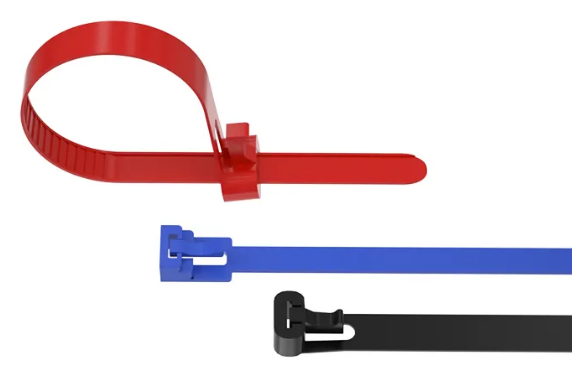What Is a Nylon Cable Tie?
A nylon cable tie, commonly known as a zip tie or tie-wrap, is a versatile fastening and bundling tool widely used in various industries and everyday applications. It is a simple yet ingenious device designed to securely tie together or bundle items. In this article, we will explore the history, design, applications, and benefits of nylon cable ties, highlighting their essential role in modern life.
History of Nylon Cable Ties:
Nylon cable ties were invented by Thomas & Betts, an American electrical components manufacturer, in the late 1950s. They were originally conceived as a solution for the aviation industry to address the need for a reliable and easy-to-use method of securing wiring and components in aircraft. Before the introduction of nylon cable ties, securing wires and cables in aircraft was a labor-intensive and time-consuming process. The innovation of nylon cable ties revolutionized the industry by offering a quick, efficient, and durable alternative.
Construction and Material:
Nylon cable ties are typically constructed from nylon, a synthetic polymer known for its exceptional strength, flexibility, and resistance to environmental factors. The nylon used in cable ties is often nylon 6/6 or nylon 6, which are two of the most common varieties. These nylon resins are chosen for their high tensile strength, durability, and resistance to heat and UV radiation.
The strap of a nylon cable tie is flat and flexible, and it typically features a series of ridges or teeth on one side. The teeth are designed to interlock with the ratcheting mechanism on the other end of the strap when the tie is tightened, creating a secure and tamper-resistant connection. The ratchet, or locking mechanism, inside the head of the cable tie ensures that the strap remains in place after tightening and prevents it from loosening.
Types of Nylon Cable Ties
Nylon cable ties come in various types to cater to different needs:
Standard Nylon Cable Ties: These are the most common type, widely used for bundling cables and wires. They come in various lengths and thicknesses to accommodate different cable sizes.
Heavy-Duty Nylon Cable Ties: Designed to withstand extreme conditions, heavy-duty cable ties are perfect for outdoor and industrial applications. They are highly durable and resistant to UV radiation, making them a top choice for securing objects in harsh environments.
Releasable Nylon Cable Ties: Releasable cable ties offer the advantage of being reusable. You can release and reattach them as needed, which is handy for situations that require periodic adjustments.
Colored Nylon Cable Ties: These come in a variety of colors and are often used for organizational purposes. Different colors help identify and group cables efficiently.
Benefits of Nylon Cable Ties:
Nylon cable ties offer numerous benefits that contribute to their widespread use:
1. Ease of Use: They are incredibly simple to use. Pull the strap through the head, tighten it to the desired level, and cut off the excess. No special tools are required.
2. Versatility: Their applications are virtually limitless, making them an essential tool in numerous industries and everyday life.
3. Durability: Nylon cable ties are designed to withstand a wide range of environmental conditions, including exposure to heat, cold, moisture, and UV radiation. This durability ensures they maintain their integrity over time.
4. Cost-Effective: They are a cost-effective solution for bundling, fastening, and organizing, making them a preferred choice for many applications.
5. Safety: Cable ties are designed to be tamper-evident. Once tightened, they are not easily loosened, providing a level of security in various settings.
6. Space-Efficiency: Their slender design ensures they occupy minimal space, making them ideal for applications where space is limited.
7. Reusability: While designed for one-time use, cable ties can be reused if they are not over-tightened or damaged during removal.
The benefits of nylon cable ties include their affordability, ease of use, and versatility. They are available in various lengths, from just a few inches to several feet, and they come in a range of colors, which can be helpful for color-coding or aesthetic considerations. The one-way locking mechanism ensures a secure hold, and their robust construction makes them dependable for long-term applications.
Conclusion
In conclusion, a nylon cable tie is a deceptively simple but incredibly useful fastening and bundling tool made from nylon plastic. Its versatility and durability have made it an essential component in numerous industries, as well as in everyday applications. Whether you're tidying up a tangle of cables, securing items in your garden, or tackling a DIY project, cable ties offer a practical and cost-effective solution for managing and organizing your surroundings.


Comments
Post a Comment